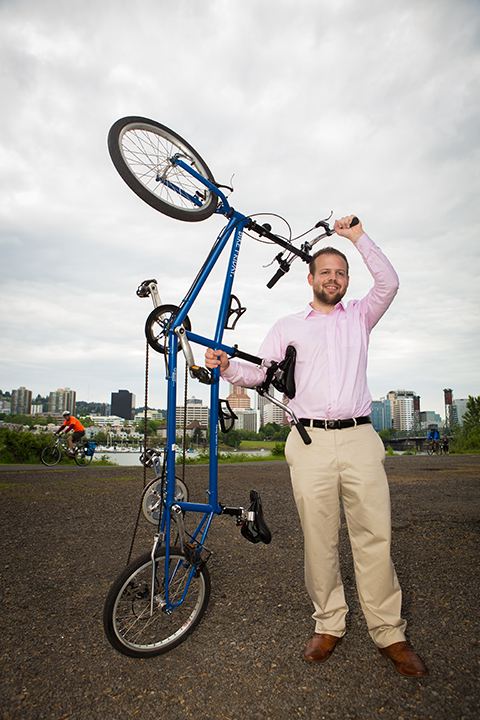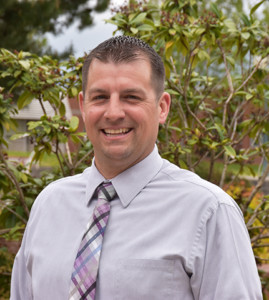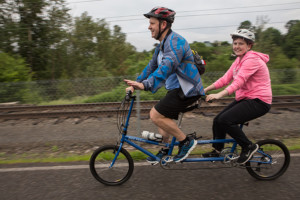
Pictured above: NWABA founder/Executive Director Billy Henry, a 2010 graduate of Hudson’s Bay High School. Photo by Katharine Kimball Photography.
At the Northwest Association for Blind Athletes, impairment is not synonymous with impediment. Take NWABA’s founder and executive director, Billy Henry.
Although he is legally blind, the 24-year-old has powered a fledgling nonprofit into a life-transformer for more than 1,200 children, adults and military veterans in four states who are blind or visually impaired.
Henry established NWABA with friends when he was 15 years old. Powerlifting was the focus for the then-student at the Washington State School for the Blind and Hudson’s Bay High School. Congenital optic nerve hypoplasia, a leading cause of visual impairment in children, didn’t keep Henry from clinching world titles in bench press and deadlift.
But he knew not all children have the same opportunities. Some 56,000 school-age children are blind or visually impaired. Seventy percent never experience sports or physical activities.
That’s changing because of the NWABA.
Like many nonprofits, NWABA started small. Henry’s parents cooked dinner and ferried the teenagers to and from their home, the hub of operations. Henry juggled the association and his studies at Hudson’s Bay, where twice he was named Student of the Month and once was nominated for the Marshall Youth Leadership Award. “I had a phenomenal experience,” he says. Bonds with teachers such as Andy Meyer, now an associate principal at the school, continue long after his 2010 graduation from Bay.

#TeamVPS: Meet Hudson’s Bay Associate Principal Andy Meyer.
When it was time for college, he enrolled first at Clark College, then headed to Washington State University Vancouver. He plans to graduate with a bachelor’s degree in public affairs in spring 2017.
Henry’s determination has filled knowledge or experience gaps over the past nine years as he secured funding and 501(c)(3) status; focused on expanding programs; and built a board of directors, small yet highly dedicated staff and volunteer base of 500.
From powerlifting, NWABA has grown to offer individual and team sports including skiing, judo, tandem cycling, fencing, dragon-boating and goalball. Most activities are free or charge a small optional donation. No one is turned away due to cost.
NWABA athletes typically compete in games and tournaments that are not designed for people with visual impairments. This exposure, Henry hopes, is insightful for the general public, who might have had few encounters with the low-incidence blind population.
It’s meaningful for the athletes to interact with others of all sight abilities. Sonja Steinbach can attest. The manager of NWABA’s men’s and women’s goalball teams and teacher at the Washington State School for the Blind says, “We are as much a family off the court as we are a team on the court.”
The organization also provides educators with sports adaptations for the success of students who are blind or visually impaired, most of whom attend traditional schools.
But NWABA goes beyond athletics. “We recognized that there was something more that we could be doing to help people,” Henry says. “That’s what keeps me going.”
Henry views the work as a way to disrupt what can be a sedentary, lonely existence for children and adults with blindness and visual impairments. Seventy percent of the latter nationwide are unemployed.
“It’s about building confidence; gaining independence, self-esteem; and helping people improve their quality of life so they can go out and do whatever they want to do,” Henry says.
Though he’s already proven that to be true of himself, he’s determined to do much more: expansion throughout the Pacific Northwest and in Idaho, with satellite offices and more programming in 14 locations. But Vancouver will remain the base of operations. “Our roots are in Vancouver and Clark County,” he says. “It’s where we started and where we want to stay because the community’s been so good to us.”

Athletes ride a tandem bicycle along the Springwater Corridor. Photo by Katharine Kimball Photography.
Expanded sports adaptations also are in the works, with more training materials and a larger equipment hub to house adaptive materials that can be shipped to teachers all over the region free of charge.
“His spirit, knowledge and integrity are going to take the organization very, very far,” says longtime volunteer Susan Courtney.
Along the way, Henry’s speaking an underappreciated truth that benefits from repetition: “People who are blind can do anything they want to do. There just needs to be some degree of adaptation for them to be successful.”
Thanks to Henry and NWABA, everyone can see that.
